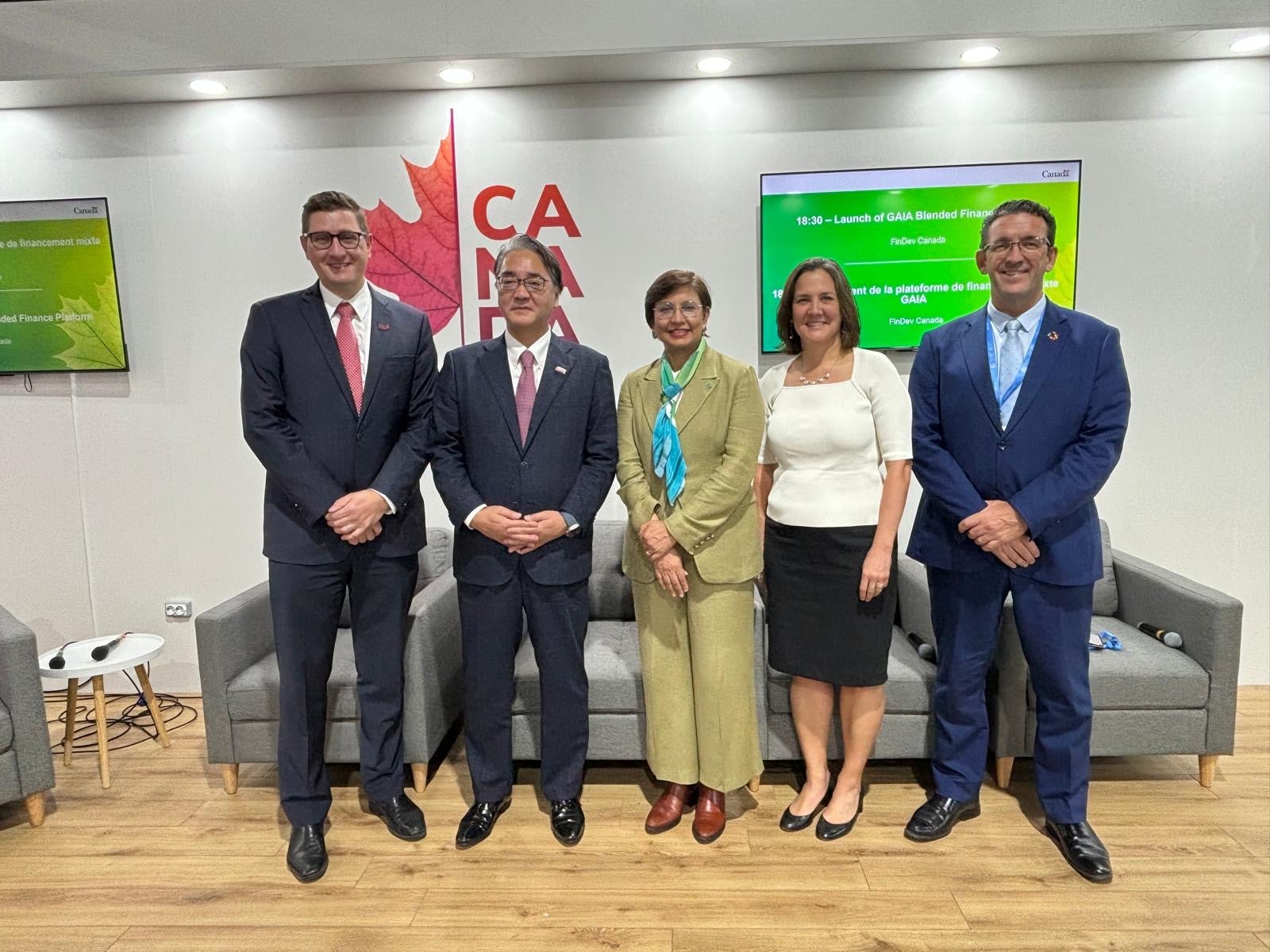Photo: Paulo Martelli, FinDev Canada, Fumitaka Nakahama, MUFG, Kavita Sinha, Green Climate Fund, Kristen Sarri, USAID and Andrew Johnstone, Climate Fund Managers (from left to right)
Last week, world leaders from government and business gathered in Azerbaijan for COP29 – the second most attended COP – to discuss global progress on addressing climate change. After intense negotiations, an agreement was reached in overtime. The New Collective Quantified Goal (NCQG) for developing countries was set at US$ 300 billion annually by 2035, triple the initial goal in 2009. The agreement seeks to secure additional funding from public and private sources of up to US$ 1.3 trillion annually by 2035. FinDev Canada participated with its partners and clients, and shares its key takeaways.
1. DFIs demonstrated their unique role to work with and through the private sector to achieve climate goals
DFIs play a significant role in bridging the gap between the public and private sector by being agile, quick to market, and able to accelerate private capital mobilization. This complements multilaterals, which bring leadership given their balance sheets, research, and market signals. Together with other DFIs, we are talking about billions in firepower – oftentimes with only one shareholder.
Since 2018, FinDev Canada has disbursed over US$ 1 billion across priority regions and created a new model of climate finance such as the GAIA platform announced at COP29. The blended finance platform will deploy US$1.48 billion in long-term loans and technical assistance to support climate adaptation and mitigation projects in up to 25 EMDEs. As mentioned by Minister Guilbeault, Canada’s Minister of Environment and Climate Change, GAIA “brings together much-needed public and private capital and expertise to action climate finance differently”. More than that, GAIA seeks to be a roadmap for climate and blended finance, offering a blueprint for others to replicate and mobilize capital at even greater scales.
2. Adaptation is our new normal.
2024 is on track to become the hottest year on record, further emphasizing the reality of climate change. According to the 2024 Adaptation Gap Report, the financing gap to adapt is estimated between US$ 187 and 359 billion per year.
At COP, the increased focus on adaptation put it on level footing with the mitigation priority. For example, FinDev Canada and British International Investment, on behalf of the Adaptation & Resilience Investor Collaborative, The Lightsmith Group, and the Global Adaptation and Resilience Investment Working Group (GARI) led an adaptation discussion about how to accelerate private finance for climate adaptation and resilience. We need all players around the table and all solutions on the table
FinDev Canada also joined the Global Environment Facility (GEF) to unveil the winners of the Challenge Program for Adaptation Innovation. The event recognized climate adaptation projects, such as developing virtual green banks and resilience-building bonds. It showcased financial and non-financial solutions as well as the continued collaboration between DFIs and multilateral partners, such as GEF.
One financial tool that will play a role in the NCQG will likely be local currency - an instrument that mitigates certain risks for private sector clients in more volatile EMDEs. For example, the GAIA platform plans to offer loans, technical assistance, and local currency while bringing a diverse group of public and private investors around the table.
COP demonstrated that addressing the world’s climate challenges requires an unwavering commitment to collaboration and investment across sectors, particularly adaptation. As we look to COP30 in Brazil, FinDev Canada will focus on providing more in-country support to private sector clients and working with host governments to mobilize capital at the pace and scale needed to meet Azerbaijan's ambitious climate goal.
